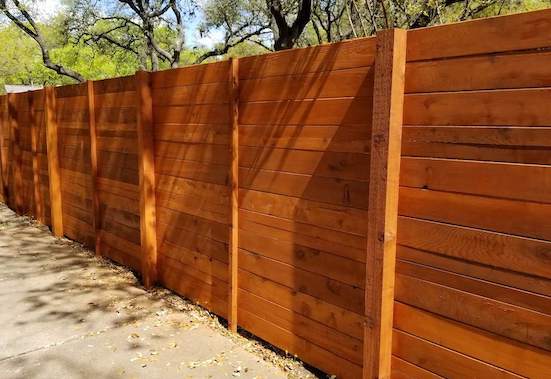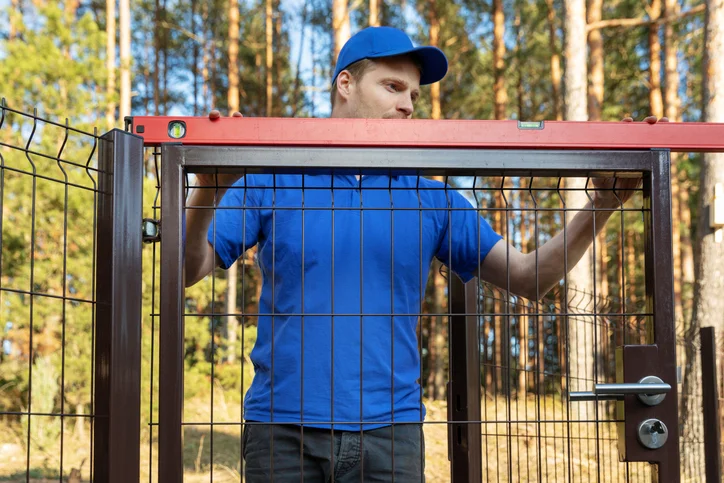Tips for Choosing a Qualified Fence Contractor Near Me
Tips for Choosing a Qualified Fence Contractor Near Me
Blog Article
Exactly How to Recognize Common Concerns That Call For Immediate Fence Repair Service
It is critical to spot issues before they become bigger problems when it comes to maintaining your fencing. Regularly inspecting for indications of rotting wood, leaning panels, or rust can save you money and time in the long run. You could not understand exactly how weather and bugs can jeopardize your fence's honesty. Let's explore the usual indications that show your fence requires instant interest, so you can keep your residential property safe and secure and looking its best.
Indications of Rotting Wood in Wooden Fences
Have you discovered your wood fencing looking a bit shabby? If so, it could be time to look for indicators of deteriorating timber. Take a look at the base of the messages and panels for soft places. That's a clear indicator of rot if you press on the wood and it really feels spongy or collapses. Next off, seek staining or dark places on the wood-- these usually signal moisture damage. Take note of any peeling off paint or coating, as this can reveal the wood to further degeneration. Furthermore, a pungent, mildewy smell can show fungal growth. Don't neglect to check links and joints; if they're loose or breaking down, the timber underneath is likely endangered. By catching these indicators early, you can avoid extra considerable damage and keep your fencing standing strong. Normal maintenance is key to extending the life of your wooden fencing.
Leaning or Tilting Fencing Panels
If you have actually seen your fence panels leaning or turning, it's essential to recognize what caused it. This problem might show underlying structural damage that needs your attention. Let's explore the common reasons and the fixing alternatives offered to get your fencing back fit.

Reasons For Leaning Panels
It's often an indication of underlying concerns that need dealing with when you see your fencing panels leaning or tilting. One usual cause is inadequate drain; excessive water can deteriorate the soil around the fencing articles, compromising their support. An additional culprit could be strong winds or storms that push versus the panels, especially if they're not appropriately secured. Additionally, the all-natural settling of soil in time can create posts to shift, causing a tilt. Bugs, like termites, can endanger the honesty of wood panels, triggering them to lean. Bad installment techniques may result in panels not being firmly established, leaving them at risk to leaning under stress. Address these problems immediately to preserve your fence's integrity.
Indicators of Architectural Damage
Observing leaning or tilting fence panels can be startling, as these issues typically suggest architectural damage that requires instant attention. When your fencing starts to lean, it may signify that the posts are changing or that the dirt around them has deteriorated. Pay close interest to gaps between panels or articles, as these can also recommend instability. deck builder. In addition, look for cracks or splintering in the wood, which can deteriorate the general structure. It can jeopardize the stability of the fence if you see rust or deterioration on metal components. Bear in mind, overlooking these signs can result in more extreme damages down the line, so it's vital to assess the scenario without delay and do something about it before it gets worse
Repair Work Options Available

Rust and Corrosion in Steel Fences
If you have a steel fencing, you might observe corrosion and deterioration creeping in with time, particularly if it's exposed to wetness. These problems not just affect the appearance of your fence yet can additionally jeopardize its structural honesty. To identify corrosion, try to find reddish-brown places or patches, which suggest the metal is oxidizing. Rust can spread out swiftly if left neglected, weakening the fence and leading to expensive repairs.To tackle rust and rust, you should clean up the affected areas with a cord brush and use a rust-inhibiting primer. When the guide dries out, think about painting the fence with a weather-resistant paint to safeguard it additionally. Normal upkeep, such as examining for signs of rust and retouching paint as needed, will certainly aid expand your fencing's life expectancy. Resolving these issues promptly assures your steel fence continues to be strong and visually appealing for several years to find.
Cracks and Splits in Plastic Fence

Reasons of Plastic Damages
Plastic fencing is preferred for its longevity, yet it can still deal with fractures and splits due to numerous factors. One major reason is extreme temperature level variations. It can damage the material over time when plastic broadens in the warmth and agreements in the cool. Additionally, direct exposure to extreme sunlight can bring about UV destruction, making the plastic brittle. Physical influences, like unintentional collisions or heavy branches, can likewise produce splits. Poor setup or using low-grade products can worsen these issues. Furthermore, age contributes; older plastic secure fencing is much more at risk to damages. Routine assessments can assist you determine these aspects prior to they bring about considerable problems. Take aggressive steps to assure your fence stays solid and undamaged.
Fixing Cracks Effectively
Splits and divides in your plastic secure fencing can be worrying, resolving them quickly can stop further damages and maintain the fencing's look. First, analyze the size of the crack. For tiny cracks, a plastic repair kit commonly includes adhesive that can bond the sides, providing a smooth repair. Clean the area completely before applying the adhesive, ensuring it adheres properly. For bigger divides, you may need to utilize a plastic spot. Cut the patch to size, use adhesive around the sides, and press visit homepage it firmly onto the split. Enable it to heal as per the maker's instructions. Normal maintenance and quick fixings can extend your fence's life-span, keeping it looking terrific for years ahead.
Loosened or Missing Fencing Posts
Missing or loosened fence messages can undermine the stability of your entire fence framework. It's important to deal with the problem right away if you see any posts wobbling or leaning. Examine for any indicators of motion, as this can bring about further damages with time. You can conveniently examine the trouble by providing each blog post a mild shake-- if it feels unstable, it's time to take action.For missing blog posts, you'll require to replace them as quickly as feasible to keep your fencing's stability. Make certain they're securely anchored in the ground with concrete or gravel for added security when you mount new articles. If a blog post hangs, tighten it by including additional support or driving it deeper into the ground.Ignoring these issues can cause bigger issues, like gaps in your fencing or even total collapse. Keep an eye on your posts and remain positive about fixings!
Damages From Climate and Natural Environment
Weather and natural environments can ruin your fence, causing various types of damages that need punctual focus. Hefty rain can trigger wood to look at here now rot, making it weak and unsteady. Snow buildup could flex or break panels, while strong winds can root out fencing messages or create areas to lean.If you see fractures or splintering in wood fences, it signifies drying out because of intense sun direct exposure. Metal fencings can rust if protective layers put on off, specifically in seaside or humid areas.Inspect your fencing routinely after tornados or severe weather condition to catch any damages early. Dealing with these concerns promptly can conserve you from costly repairs down the line. Do not wait till a tiny issue develops into a significant one; stay aggressive and keep your fencing in leading shape to maintain both performance and curb charm.
Pest Invasion and Termite Damages
It's essential to act rapidly to avoid more damage when you observe indicators of insect infestation or termite damages. Seek mud tubes along your fence or hollow-sounding timber, as these indicate termites are at work. You could likewise see small holes or frass, which is termite droppings appearing like sawdust. If you identify any one of these indications, it's time to evaluate the damage.Don' t delay until it's far too late; bugs can jeopardize your fence's stability. Check the surrounding location for beetles or ants, as they might be adding to the issue. If you suspect an invasion, think about calling a bug control expert to confirm and deal with the issue.Repairing or changing damaged areas of your fence promptly not just restores its toughness but additionally stops pests from spreading out further. Stay watchful to maintain your building safe and secure and pest-free.
Often Asked Questions
Just how Commonly Should I Evaluate My Fencing for Damages?
You must examine your fencing at least two times a year, preferably during springtime and autumn. Regular checks help you detect damages early, conserving you time and cash continue reading this on repair services while keeping your residential or commercial property's look and security.
Can I Repair a Fencing Myself or Employ a Professional?
If you have the right devices and abilities, you can certainly repair a fencing yourself. However, hiring an expert guarantees quality job and saves you time, particularly for intricate repair work or considerable damage.
What Tools Are Needed for Basic Fence Repairs?
For standard fencing repairs, you'll require tools like a hammer, screwdriver, pliers, a saw, a degree, and gauging tape. deck builder. Depending on the repair service, you might also require nails, screws, or substitute boards
How Much Does Fence Repair Work Typically Expense?
Fencing repair costs vary extensively, but you can expect to pay in between $200 and $1,500 depending on materials, labor, and level of damage. It's clever to get several quotes for the best offer.
When Is the Best Time of Year for Fencing Repair Works?
The most effective time for fence repair services is during mild weather condition, typically in springtime or early fall. You'll prevent extreme temperatures, making it simpler to function and ensuring the materials set properly for lasting toughness (deck builder). Observing tilting or leaning fencing panels can be startling, as these problems commonly suggest structural damages that requires instant interest. Missing or loose fence blog posts can threaten the security of your whole fence structure. Snow buildup might flex or break panels, while strong winds can uproot fence messages or create areas to lean.If you notice splits or splintering in wood fences, it's an indicator of drying out due to extreme sun direct exposure. Metal fences can corrosion if protective coatings put on off, especially in moist or coastal areas.Inspect your fencing consistently after storms or severe weather to capture any damages early. Fencing repair work prices vary extensively, however you can expect to pay in between $200 and $1,500 depending on materials, labor, and level of damages
Report this page